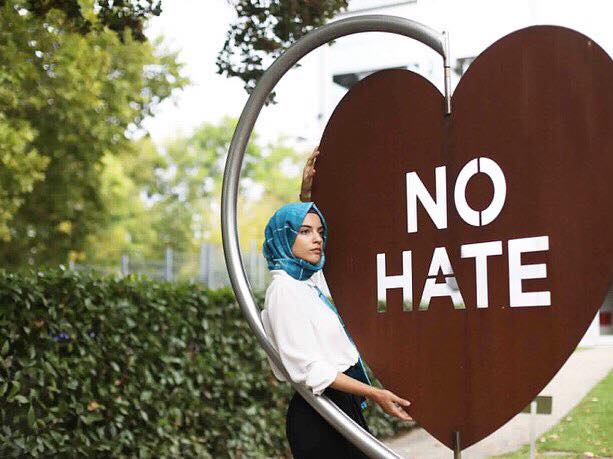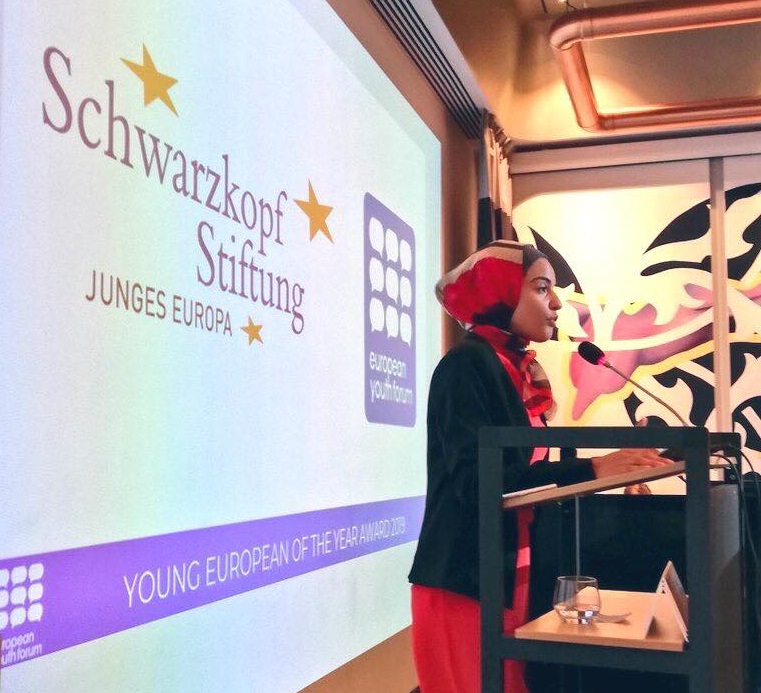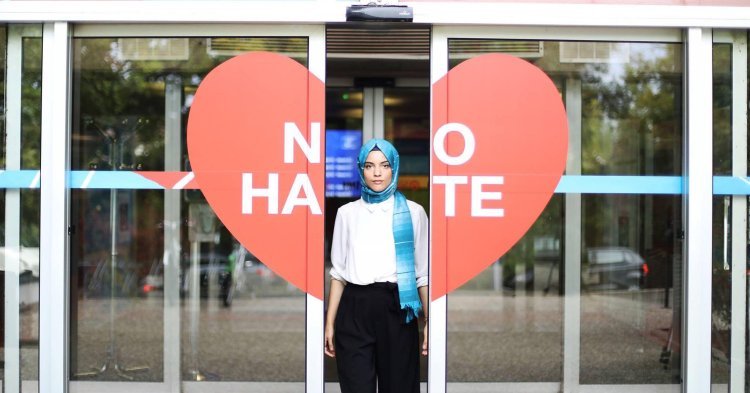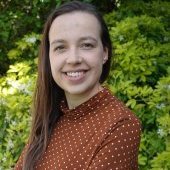While identity politics are increasingly harnessed by populist movements in an attempt to paint a picture of singular national identities, Yasmine’s powerful vision of a Europe united in diversity is a threat to this myth. It was a privilege to talk to her on Thursday last week, ahead of her award ceremony in the first interview she has given.
Madelaine Pitt, The New Federalist: Congratulations on being crowned Young European of the Year 2019! What was your first reaction when you learnt you were this year’s winner?
Yasmine Ouirhrane: Joy! I was very surprised, especially as it was a win of many firsts – I’m the first Italian to receive the award for example! I was happy for my hard work and effort I’ve put in over the years to be recognised. For me it was more a symbolic win than a personal win; it shows that being different doesn’t stop you being part of society.
Madelaine Pitt: The winner of the award is decided by Schwarzkopf Foundation Young Europe. One of the main reasons they chose you as this year’s winner is, I quote, your “commitment to equality for women and equal participation opportunities for migrants in Europe”. Can you tell us a little bit about how you came to be involved in these causes?
Yasmine Ouirhrane: I’m a proud young woman who struggled a lot to get to the position I am in today. I grew up in a society where young people, especially young women, don’t get to leadership positions and I wanted this to change. I started by volunteering in poor neighbourhoods in Grenoble, the city in France I moved to when I was sixteen, collaborating with local associations and doing private tutoring. But I felt the young people I was trying to help needed to be represented on a political level, so that’s why I started engaging at the European Parliament when I was selected for the European Youth Convention in 2017.
For the first time, I was able to debate the most sensitive issues of Europe, and understand why some people are afraid of diversity and migration, and how they worry about issues like terrorism, youth unemployment and corruption. I understood that my voice was crucial because I was able to represent minorities who were otherwise not present at this level. When I later got the opportunity to address audiences in New York, Nairobi and Paris, my message was this: I am a young person from an underprivileged background who wanted to stand up for women, for migrants and for diversity in Europe. That’s who I am and why I stand for what I stand for.

Madelaine Pitt: You recently helped organise YO!Fest in Strasbourg, an event aiming to engage young people in politics. How important should the role of young people be in shaping the future of Europe?
Yasmine Ouirhrane: Extremely important, because we are the future. But we are not at the negotiation table. When decisions are made for us, we are not there. That’s why I became a member of the European Youth Advocacy Team of the United Network of Young Peacebuilders. This network has played a leading role in recognising the role of young people in peace-building processes. Peace is not just a lack of war. Of course we talk about peace in conflict areas, but also in Europe we need more peace! We need to involve young people because we are more resilient, we are more likely to make change, we dare more, we are dreamers, we are believers. It is crucial to involve us.
Madelaine Pitt: That’s a powerful response! In terms of your own involvement, you’re already a fellow of the Young Leader Women Deliver programme, which aims to improve gender equality and women’s quality of life, and you recently attended the Emerging Women Leaders Lab at the United Nations in New York – I think it’s fair to say you’re a very international activist!
Looking at the situation in the EU, gender inequality is a serious problem, with gender pay gaps stagnating at 16%, while gender-based violence is “prevalent, severe and underreported” according to the Commission’s 2018 report. To what extent is the fight for gender equality international, to what extent is it European, to what extent is it national, and to what extent is it local?
Yasmine Ouirhrane: I’m humbled to be part of Young Leader Women Deliver programme and it gave me the unique opportunity to speak at the General Assembly at the UN alongside the former Prime Minister of Australia Mrs Gillard and the French minister for gender equality Mrs Schiappa. While gender inequality is a global problem, women in different areas experience different kinds of discrimination. As a European woman living in France, I sometimes face discrimination at work based on my physical appearance and because of my clothing choices, but when I travel to the Middle East or go to North Africa, which is where my father is from, I still witness gender-based discrimination, but for other reasons, linked to the seclusion between men and women that influences social behaviour in such societies.
So the context matters hugely; although it’s as much a global as a local problem, we have to consider the specificities of each society, even within Europe. However, this doesn’t mean we can’t show solidarity with women in other societies and join forces. According to the Human Rights Convention, equality is our right, and we need to fight for it on a European level, while taking into account national local differences.

Madelaine Pitt: Many people say Europe has not reacted adequately to the refugee crisis. Encouraged by the media, we sometimes view this issue quite simplistically and argue about which countries can and should accept X number of refugees. Is it fair to say your work shows that there is a lot more nuance to the issue, and that the debate over refugees is tied up with how we show solidarity and provide opportunities? Has Europe shown enough solidarity in your view?
Yasmine Ouirhrane: The crisis is a crisis because we can’t find an agreement. When it comes to making a clear statement on the European values we share, if Europe were clearer on this topic, Europe would die, because the reality is that people are afraid of refugees. The financial crisis, especially in my country, Italy, has impacted people heavily. On top of that, there are also populist movements which are taking power. Therefore, financially, we are weak; politically, we are weak; moreover, at the international level, we are in a very vulnerable position because of the geopolitical context.
This is why people are more likely to believe that refugees are dangerous, that they come to steal our jobs; this is the main discourse in Italy today, because when people are afraid, politicians nourish their fears. So the European response cannot be clear because at this very sensitive juncture with all the existing Euroscepticism, Europe would die.
Madelaine Pitt: Let’s talk about the populist movements you mention. You’ve been very outspoken against these. Now, we have the European elections just around the corner. How will the two causes of gender equality and treatment of refugees, which are clearly causes very close to your heart, influence the debate and what is the relevance in terms of the progression of populist movements?
Yasmine Ouirhrane: Extremism always starts with an ideology and, one time, in my country, we witnessed fascism. I grew up with the sentiment that we must be very, very aware of these ideologies which can lead to hate, and history has shown us how it can lead to genocide. In order to prevent this, I’ve always fought against racism, which I witnessed at an early stage of my life; when my mother decided to marry my father, they both faced a great deal of discrimination. It’s a very personal issue which has impacted my family since the beginning, but I have made it my strength.
In Italy, we thought fascism was finished; it’s coming back. We have some new parties trying to win seats at the European elections, proposing some of the most insulting policies. So yes it is scary, but this only motivates me even more to stand for what I stand for, for peace, human rights and rule of law. So I stand up and say, I am European and I belong, I’m Italian and I belong, I’m a woman, I’m a citizen, I’m a person, I expect to be respected for that.
Madelaine Pitt: These multiple facets of your identity seem to be a driving force for you in your work. In contrast, a lot of far-right rhetoric seems to centre around imposing a narrow vision of identity, a single national identity. It’s perhaps not surprising there’s a clash of ideas here…
Yasmine Ouirhrane: The moment I was announced as the winner of Young European of the Year, I had hundreds and hundreds of hate comments, threats and insults. People told me I was an Arab, I’m not European – and actually I found this funny! I knew this would happen because it happens to me already daily, I am discriminated against in many different ways very frequently in my life. But the extent of the hateful comments allowed me to show everybody what we need to counter. For me, it has always been evident what we need to counter, but for others who don’t experience this personally, it’s hard to explain.
When it comes to identity, I’ve thought a lot about my multiple identities. I’m very confident in who I am and the fact that I belong, and I find it sad that others don’t acknowledge this. I’m an Italian, but I shouldn’t have to prove that I am European by origin to be a European. If you were born in Europe, if you feel European, even if like me one or both of your parents comes from elsewhere, if you share European values, you are a European. This is my message – of course, I’m still Italian, and yes I eat pasta every day, but we still all belong here, even though not everyone recognises this.
Madelaine Pitt: Continuing this idea of European identity, this is something that is very relevant in the current debate over Brexit. You’ve recently expressed support on Twitter for anti-Brexit campaign groups including Our Future Our Choice (I was really happy to see that, as that’s the one I’m part of!). For me, the debate surrounding Brexit is also about identity, more than it is about economics or politics, with many British people not “feeling” European. To what extent can we really say that there is a “European identity” and if there is one, how many people in Europe today really buy into it?
Yasmine Ouirhrane: This is one of the main challenges of Europe – we are lacking a common identity. We don’t share a common language, aside from English as a lingua franca. I agree that Brexit is a lot to do with identity, but it’s also about migration; many Italians and others came to the UK to work and study, and British people at times felt overwhelmed, especially in times of crisis. But it is important to strengthen our European identity.
Madelaine Pitt: How?
Yasmine Ouirhrane: I think the Erasmus scheme is essential. Having the chance to spend time studying abroad is something you never forget. I’m on a double degree programme with the University of Turin, but visiting my own country effectively as an Erasmus student allowed me to really feel European. However, young people who undertake the scheme are in a minority, so we should promote this, and also exchanges at the high school level.
Events for young people are also important, such as the European Youth Event, and last year I wanted to bring more diversity to that event. We obtained funds from the European Parliament to allow young people from underprivileged backgrounds to attend, because, even though it’s an open event, the only people who come are people who can afford it. I managed to sponsor 30 people and most of them were from migrant backgrounds, all born and living in Italy and France. Some of them felt European for the first time. So we need more inclusive youth events where young people from all backgrounds can speak and be heard.
Madelaine Pitt: It sounds like you have far more important things to do than speak to us, so we’ll let you get on with changing the world, but one last question: if you could have dinner with any political figure or activist, who would it be?
Yasmine Ouirhrane: Angela Davis is my role model. She’s a former activist, she’s an intersectional feminist and is now professor emerita at the University of California. She gave me the understanding of the concepts of race, gender, class within feminism. I identify as an intersectional feminist thanks to her.
Madelaine Pitt: Oh, and how many languages do you speak?
Yasmine Ouirhrane: Five. Contrary to what people might think, my Arabic is my weakest language; I speak Italian, French, English and Spanish.
Yasmine received her award at the weekend at the Youth Forum in Brussels. You can follow her on Twitter @yasmineojay and watch her full speech at the award ceremony.



Follow the comments: |
|
